- Home
- Jeff Mariotte
Brass in Pocket Page 6
Brass in Pocket Read online
Page 6
“Compared to what?”
“When I met him I was… well, I was a runaway. I hitched a ride to Vegas, and when I got here I fell in with some bad people. Deke was working a case and he saw me getting beat up by… by this guy.”
By your pimp, Nick mentally filled in. He kept his mouth shut.
“He broke it up,” she went on. “Broke the guy’s arm and jaw, in fact. He took me out for breakfast and by the end of it he offered me a job. Even though I was a mess, with black eyes and blood and snot coming out my nose and lips split open, he thought I had something to offer.”
“I see.”
Camille shook her head again. “No, you don’t. You don’t see anything except what your cop eyes want to see. He never touched me like you’re thinking, in a, you know, sexual way. Never once. He saw that I could be a help to him and he paid me to do work that would help. He gave me as many hours as he could afford. I got my own place and I’ve stayed straight and out of trouble. For him.”
She had read him right, and Nick was sorry for that. He didn’t like seeing kids abused, and he hated pimps with a fiery passion. He’d even had a short affair with a prostitute named Kristy Hopkins, until her pimp had murdered her. The fact that Nick had been blamed for the murder had nothing to do with his disdain for their kind—it was a pure, raw anger at bottom-feeders who preyed on the weak and made their living off the labor of others. But he had made an assumption about Camille—a series of them—and he regretted having done so.
“I’m sorry, Ms. Blaise,” he said. “Honestly. I know this is hard on you.”
“And it’s going to get harder.” She sniffed. “I don’t know what I’m gonna do now. I mean, he can’t even write me a letter of recommendation, can he?”
“I guess not.”
“Or answer phone calls about my references.”
“I can write you a letter, Camille.”
A surprised smile lit her face. “You would do that for me?”
“I’d have to be honest. Say I don’t know you that well, but in the course of my investigation I learned what you had done for Freeson.”
“Better than a poke in the eye with a burning hot rod, right?” The smile vanished, replaced by a sidelong look of distrust. “What would you want for it?”
“Nothing. I just want you to get another job you like. Here in Las Vegas or back in New Haven, either one. Or someplace else entirely, if you’d rather. I wouldn’t blame you if you wanted to move, after this.”
“Vegas, baby,” she said with a grin. “I’m staying put.”
He couldn’t deny being glad to hear that. It wasn’t that he was interested in her, romantically or sexually. She was definitely not his type, and too young even if she had been. But he wanted to know that the dirty side of Las Vegas didn’t have to spit out all the people it chewed up—that there were some who could look it in the eye and survive it, whole and relatively undamaged. He had begun to think Camille Blaise might be one of those.
“One more thing, before I let you go. Can you think of anyone, recently or not, who might have had a grudge against Deke? I’ve been thinking it’s all got something to do with this Antoinette O’Brady, but maybe I’m way off base. Maybe she went on the run because she had witnessed Deke’s murder and she’s afraid, and Deke was the shooter’s only target all along.”
Camille smiled again, not with the wattage displayed last time, but with real satisfaction. “There was this one guy. Penfold… Will Penfold, that’s it.”
“Good. Thank you. What’s his beef with Freeson?”
“He hired us. He doesn’t have a lot of money—he drives a beer truck, for God’s sake, for Copper Blade Beer and Beverage. But he had this idea that he thought would make him, like, a billion dollars. He had this partner he went in on it with, and then he thought the partner was selling him out, meeting with big companies and trying to sell the idea out from under him. He hired us to find out if the partner was really doing what he thought.”
“What was his great idea?”
“Beer-flavored underwear.”
Nick felt his jaw falling open. “You’re kidding me.”
Another shake of the head, another flurry of hair. “Nope.”
“Was the partner cheating him?”
“Trying to. Only it turns out nobody was that interested.”
“Imagine that.”
“But Will didn’t believe Deke. I mean, when he said there were no buyers for the idea. He thought Deke had been bought off by the partner, and they were splitting the millions that rightfully should have been his. He punched Deke, right in the throat.” She pointed to the visitor’s chair. “Came up out of that chair and just laid into him, right in front of me. I was screaming and thought I’d have to call the cops. But Deke just took a couple of punches, then grabbed this guy Penfold, held his arms down, and told him to get the hell out and not come back. Penfold left, and on his way out he said if he found out Deke was in bed with his partner, he would kill him.”
“He wasn’t, though,” Nick said. “In bed. Figuratively.”
“Or any other way. But maybe Penfold doesn’t believe that. He might still think there’s a million bucks calling his name.”
“For beer-flavored underwear. I’ll check Will Penfold out, Camille. Thanks.”
“Thank you.”
“For what?”
“For explaining why you asked the question you did. For not assuming I’m some idiot just because I’m young and cuddlesome.”
“I didn’t say you were cuddlesome. I don’t think I’ve ever used that word before.”
“You don’t need to. I already know I am. But you know what? It turns out that somebody can be adorable and not stupid at the same time. Go figure.”
“Yeah, go figure,” Nick said.
Twenty-five minutes after getting Mandy’s news, on top of Nick’s, Catherine was back at the Rancho Center Motel, looking at the sign-in log kept by the uniformed officer posted outside the room until she released it. Her signature was on it, as were Nick’s and David’s. Various other cops, uniformed and detectives, had been in. The guys who had picked up the body for the coroner’s office had signed it.
Jim Brass, though, had not signed the sheet.
The easiest explanation—that Brass had heard the original call, been in the neighborhood, stopped by and seen Deke’s body before she got there—was the one she had been very much hoping would turn out to be correct.
But that wasn’t the case.
If Brass hadn’t been here since the police had first shown up, that meant he had been here before that. Most likely while Deke Freeson was still alive.
Now she had a dead private investigator who Brass had known, a missing woman, a police-style battering ram left at the scene, and Brass’s fingerprints in the room.
Maybe Brass had a good explanation for it all.
Catherine devoutly hoped that he did.
9
RILEY HAD ALREADY photographed the bone pit from every possible angle except underneath the bones looking up. Now she focused on individual bones, photographing the ones on which she had found unnatural nicks, cuts, and scrapes. In her profession, these were considered “tool marks” until the actual “tools” that had caused them were identified, but she knew that they were really knife marks. The attacker would have had to strike hard and deep to leave these marks in the bones—strikes that, to her, indicated explosive fury.
Fury directed toward innocent animals.
Riley had grown up knowing that people’s mental states came in every condition—calm, disturbed, disoriented, brimming with contentment or quivering with confusion or roiling with rage. Her parents dealt with it by studying the workings of the mind and trying to help people achieve some sort of balance.
Riley’s response to this knowledge had been different. People had to want help to seek out psychiatric care—or they had to be forced into it by the courts. In the latter case, it was often too late to do much to help their victims. Tha
t became Riley’s goal: helping them—even belatedly—by working to identify and apprehend the perpetrators before whatever disconnected wires they had in their brains caused them to injure or kill again, and by giving voice to the dead by interpreting the clues left by the circumstances of their deaths.
People were never responsible for their own murders, in her mind. But they could bear some of the blame, on occasion, through bad choices they made, the sorts of people they chose to be around, the acts they committed that might drive others to that final, extreme action. Animals, though, rarely made such poor choices, and when they were antagonistic toward people, it was never malicious. They were slaughtered for food and hunted for sport. However she felt about those two activities, this pit was evidence of something else—pure cruelty toward creatures who had done nothing to deserve it and who, in most cases, could not fight back.
While she photographed cut bones and bullet holes, Greg was busily collecting specimens of animal hair, soil samples, and tiny bits of vegetation found inside the pit. One never knew where the smallest clue might lead, so they took specimens of everything.
“Riley?”
“Yeah?”
“Come here for a second.”
Riley carefully set down the bullet-scarred skull she was about to take a picture of and made her way around the pit. Greg had gone back to the sheep, and he was holding its head up, shining his light at the animal’s throat. “Something just occurred to me,” he said. “Look at these wounds.”
She had already looked once. Which, really, was more than enough. “Is there something new?”
“Look closely. Around the edges.”
She forced herself to move in for a more careful examination. You couldn’t be squeamish in this business, but she had to fight back a wave of revulsion. “Okay.” She thought she saw what he was talking about—he had tipped her off by saying wounds, plural, instead of wound. “There are smaller, more shallow cuts around the periphery of the big cut.”
“They show hesitation,” Greg pointed out. “As if the cutter was taking practice cuts before making the final, more confident slice. Building up his courage, maybe.”
“But he had already killed all these other animals.”
“Nothing this big, though. It’s still a step up, from a dog or cat to an animal this size. I’m betting we’ll find that the smallest animals came first, and the larger ones are more recent.”
“A size progression,” Riley said.
“Exactly.”
“You’re thinking something, Greg. I can see it in your eyes.”
“I’m thinking that these are all just practice. The progression worries me.”
She had to ask, even though she was afraid she knew the answer. She had been starting to think the same thing. “Worries you because… ?”
“Because people who do this sort of thing often don’t stop with animals.”
“They move on to people,” she said.
“That’s right. Whoever did this is seriously disturbed. I’m afraid we might be looking at the early stages of a serial killer in the making. The use of guns and knives bothers me, too, instead of one or the other. It’s like he’s trying to figure out what he’s most comfortable with. I can’t find any bullet holes in the sheep, so maybe he’s settled on knives. And another thing—now that the hotel construction has begun, he has to know his burial pit will be found, or already has been. What sort of response might that trigger? I think we should check for any recent unsolved homicides with knives or guns, and see if there are any factors in common with these killings.”
“You think he’s already taken that next step?”
“No way to tell, but if he hasn’t, I want to find him before he does. And if he has, I want to find him before he does it again. Once you’ve done a sheep, a human being is pretty much the next size up.”
“I just have a few more photos to get. Are you about done?”
“Just about,” Greg said. “Let’s finish this and get out of here. I want to get the ME’s van out here to pick up this sheep—I think it’ll bear a closer examination.”
“Doc Robbins will love having a murdered sheep on his table,” Riley said.
“Believe me,” Greg said, specifically remembering a gut-shot deer wearing a cocktail dress, “he’s had a lot worse.”
Nick had just arrived back at the lab and was on his way to Catherine’s office when David Hodges waylaid him. Lean, with short graying hair and an almost pathological desire to please those to whom he reported, Hodges was hard to like, but also hard to seriously dislike. Nick tolerated him and tried to maintain a positive attitude about him, as he did with most people, but Hodges could get on his nerves. For sure he grated on Grissom sometimes, but Gil respected his scientific ability and occasional insight, if not his personality. Nick could do no less.
“Nick,” Hodges said. “Busy night.”
“They always are, Dave.”
“You manage to get through them, though, and usually with a smile on your face. A person’s got to admire that.”
“I guess so.” Nick nodded to the file folder Hodges carried. “You got something for me?”
“Oh, right.” Hodges shook his head briskly, as if he had completely forgotten why he had interrupted Nick. “That oily residue you brought in? From the motel scene.”
“What about it?”
Hodges flipped open the folder and glanced inside. “It’s mostly diethylene glycol monomethyl ether.”
The compound sounded familiar to Nick, but he couldn’t place it. “What’s that?” he asked with a shake of his head.
“It’s the major component of brake fluid.”
“Brake fluid.”
“Someone walked into that room with brake fluid on his shoes.”
“The first officers on the scene didn’t secure the parking lot—which, frankly, was pretty disgusting. Not as bad as the room, but bad. So we didn’t take specimens of the various fluids found there. I guess I could go back over, see if I can find any brake fluid.”
Hodges shrugged. “Not my idea of a good time, necessarily, but whatever you have to do. I’ll keep working on this and try to narrow it down further.”
“Thanks, Dave.”
Hodges was already turning around, heading back to his lab. “It’s what I live for!”
Seeing Hodges reminded Nick that he still needed results from Wendy Simms, upon whom Hodges had a long-standing crush. Instead of continuing on to Catherine’s office, Nick decided to detour past Wendy’s workstation. She was bent over a comparison microscope when he entered. “Hey, Wendy,” he said.
“Nick, hi.” She flashed a quick smile, brushed dark brown hair off her cheek.
“What’s new in blood?”
“Blood in general, or particular blood?”
“Blood from the Rancho Center Motel.”
“Oh, that blood.” She consulted a printout on the countertop. “Sounds like that scene was quite the mess.”
“It was.”
“But the thing is, although there was a lot of blood, all the samples belonged to the same person.”
“Deke Freeson?”
“I’m still waiting for confirmation on that,” Wendy said. “But if that was your gunshot victim, then I’m betting yes.”
“So all the samples we brought in were identical?”
“Right.”
“Including the blood on the bathroom window frame?”
“All of it.”
“Okay. I guess that clears that up.”
“Hope so, Nick.”
Nick walked away, finally headed for Catherine’s office.
No blood but Freeson’s was good news. As good as could be hoped for, in any case. It meant that whatever had happened to Antoinette O’Brady, at least she hadn’t been injured—to the point of bleeding—in the motel room. The blood transfer on the window frame had probably come from the spatter she had picked up by being on the bed, behind Deke Freeson when he was shot. And probably prone,
or crouched low, since the shot had been a through-and-through but had not hit her. The whole scenario was starting to come together in his head.
He needed to run it by Catherine.
But before he did that he needed a few minutes, to see if he could work the last bugs out.
Once again, he delayed that particular visit.
10
“THIS IS GRISSOM.”
“Gil, it’s Catherine. I’m sorry to bother you so late.”
“I’m not on East Coast time yet anyway, Catherine. I’ve been going over my presentation. Is everything okay out there?”
Catherine had to think about that one. Ordinarily it would have been a simple question with a yes or no answer, but not this time. She spooled a lock of red hair around her index finger. “Not exactly, no.”
“What’s going on?”
She glanced at the door to make sure no one might overhear. This time of night, her office was essentially private, and would be until the day shift came on. But she had left the door open, to send the message to her team that she was always accessible. Gil had offered to let her use his office while he was away, but he would only be gone for a few days, and his peculiar set of hobbies—collections of insects, reptiles, and other creatures, jarred and bagged, everywhere you looked—made that room less than welcoming to just about anyone but him. It was bad enough that he had given her his beloved irradiated fetal pig, which she felt compelled to keep around so as not to hurt his feelings, but she didn’t want to pass the nights surrounded by his other prizes. “It’s… well, it’s a little complicated, Gil. It’s about Brass.”
“Jim Brass?”
“That’s the one.”
“What about him?”
“Well, we had a crime scene tonight, at the Rancho Center Motel. A homicide.”
“That’s hardly surprising,” Gil said. “The place is a dump.”
“And then some. Deke Freeson was shot. The PI?”
“I know him. He’s a bit of a hard-luck case.”
“Who Brass investigated once.”
“Right, but it went nowhere.”

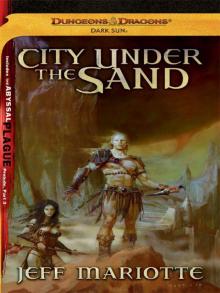 City Under the Sand
City Under the Sand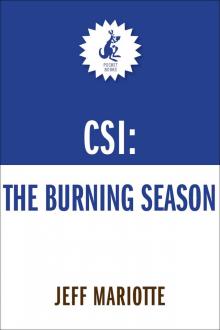 The Burning Season
The Burning Season Sanctuary
Sanctuary Winds of the Wild Sea
Winds of the Wild Sea Serpents in the Garden
Serpents in the Garden Close to the Ground
Close to the Ground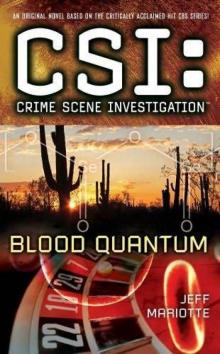 Blood Quantum
Blood Quantum Brass in Pocket
Brass in Pocket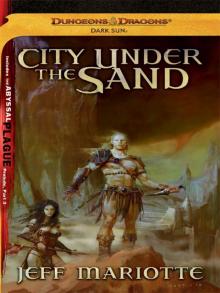 City Under the Sand: A Dark Sun Novel (Dungeons & Dragons: Dark Sun)
City Under the Sand: A Dark Sun Novel (Dungeons & Dragons: Dark Sun)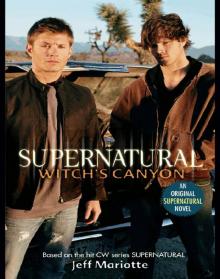 Witch's Canyon
Witch's Canyon STAR TREK: The Lost Era - 2355-2357 - Deny Thy Father
STAR TREK: The Lost Era - 2355-2357 - Deny Thy Father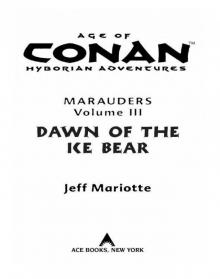 Dawn of the Ice Bear
Dawn of the Ice Bear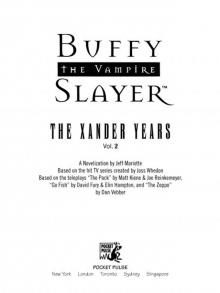 The Xander Years, Vol.2
The Xander Years, Vol.2 Ghost of the Wall
Ghost of the Wall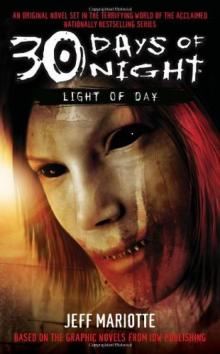 30 Days of Night: Light of Day
30 Days of Night: Light of Day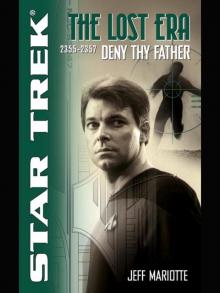 Deny Thy Father
Deny Thy Father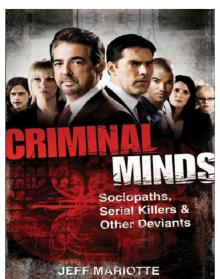 Criminal Minds
Criminal Minds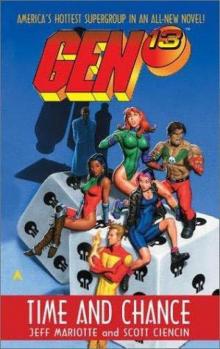 Time and Chance
Time and Chance The Folded World
The Folded World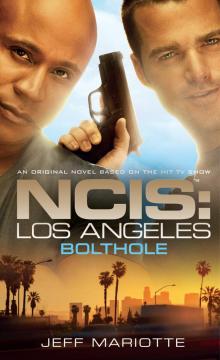 Bolthole
Bolthole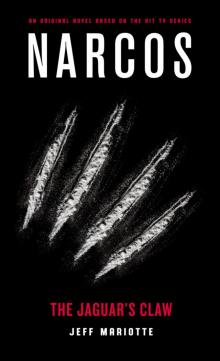 Narcos
Narcos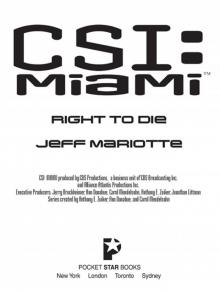 Right to Die
Right to Die